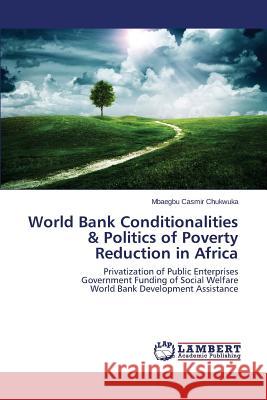World Bank Conditionalities & Politics of Poverty Reduction in Africa » książka
World Bank Conditionalities & Politics of Poverty Reduction in Africa
ISBN-13: 9783659742330 / Angielski / Miękka / 2015 / 180 str.
The book explores the linkage between World Bank loan conditionalities and politics of poverty reduction in Africa. Several decades of grappling with World Bank loan conditionalities and poverty reduction strategies have, at best, yielded meager returns as poverty and underdevelopment persist. Thus, it investigated the implementation of World Bank loan conditionalities and their impact on social welfare in Nigeria. Specifically, the book is a scholarly contribution to unmask the tenuous link between loan conditionalities and politics of poverty reduction strategies in Nigeria. Fundamentally, it is divided in to six major chapters. The first chapter which is the introduction examines the methodological rigour and elegance of the study. Chapter two x-rays privatization of public enterprises; the third chapter interrogates Government funding of social welfare. In addition, chapter four explores the World Bank loan development assistance in relation to human capacity development in Nigeria; while the summary, conclusion and recommendation were in chapter five. The book is an invaluable asset in understanding while abject poverty persist in Nigeria, and Africa at large
The book explores the linkage between World Bank loan conditionalities and politics of poverty reduction in Africa. Several decades of grappling with World Bank loan conditionalities and poverty reduction strategies have, at best, yielded meager returns as poverty and underdevelopment persist. Thus,it investigated the implementation of World Bank loan conditionalities and their impact on social welfare in Nigeria. Specifically, the book is a scholarly contribution to unmask the tenuous link between loan conditionalities and politics of poverty reduction strategies in Nigeria. Fundamentally, it is divided in to six major chapters. The first chapter which is the introduction examines the methodological rigour and elegance of the study. Chapter two x-rays privatization of public enterprises; the third chapter interrogates Government funding of social welfare. In addition, chapter four explores the World Bank loan development assistance in relation to human capacity development in Nigeria; while the summary, conclusion and recommendation were in chapter five. The book is an invaluable asset in understanding while abject poverty persist in Nigeria, and Africa at large.











